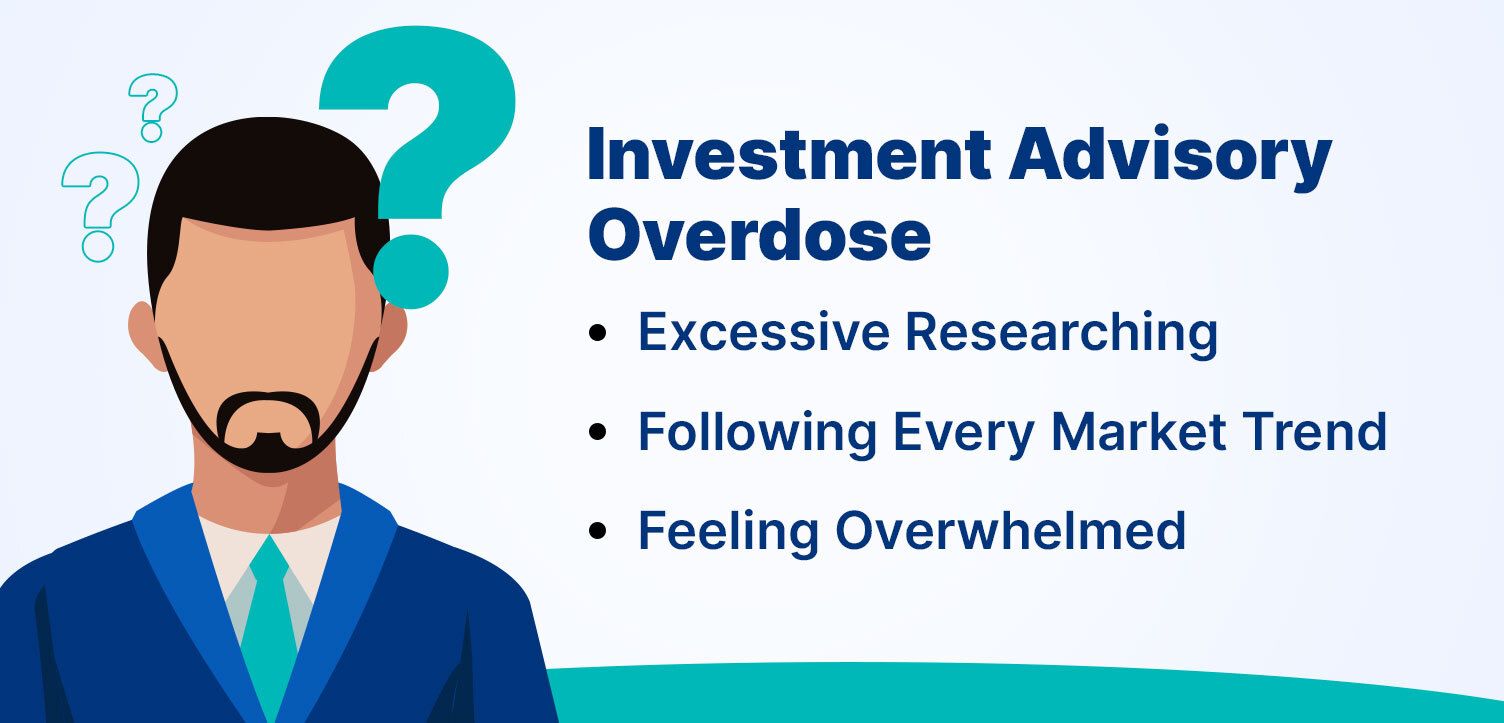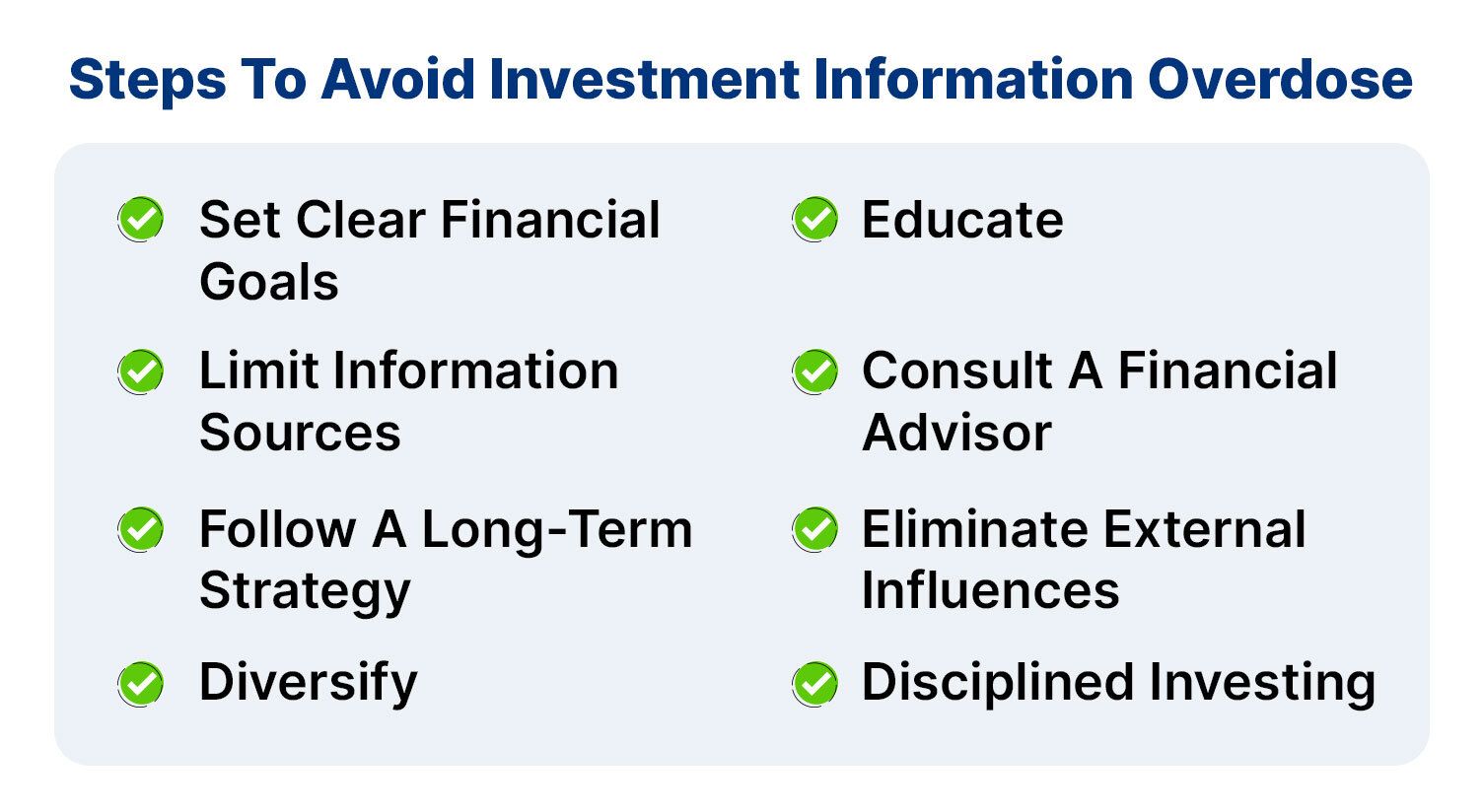Overdose Of Investment Advisory– How To Deal With It?
In today's fast-paced financial world, individuals can follow different investment strategies to grow their money. The investment advice comes from various sources, including financial experts, media outlets like TV, newspapers, business magazines and now even on social media like YouTube, WhatsApp, Telegram, Facebook and Instagram.
Although seeking investment advice is essential in making informed decisions, too much information and advice can be overwhelming. It can lead to confusion, anxiety, and even poor financial choices.
This article delves into the significance of investment advisory. It also recognises the risks of information overload and understands the consequences. Additionally, it covers practical steps to save oneself from feeling overwhelmed.
The Significance Of Investment Advisory
Investment advisory plays an important role in helping individuals navigate financial markets. For most people, investing can be intimidating and overwhelming, especially in stock markets involving fundamental and technical analysis. Receiving guidance from professionals can help identify potential opportunities, manage risks, and achieve long-term goals. For those unfamiliar with investing, seeking advice can instil confidence. It can imbibe a sense of security in their financial journey.
Recognising The Overdose Of Investment Advisory
While investment advice can be valuable, look for the signs of information overload to avoid making hasty and ill-informed investment choices.

Some common indicators of advisory overdose include:
- Excessive Researching
If you obsessively use the internet, it could be a sign of information overload. You might constantly scour the internet for stock news, market updates, and expert opinions. Avoid excessive research on different platforms, and always check the credibility of the platform you are using to get advice. - Following Every Market Trend
Chasing after every market trend or getting swayed by short-term movements can lead to impulsive decisions, bad entry and exit, and losses. - Feeling Overwhelmed By Conflicting Opinions
When you encounter conflicting advice from various sources, it can create confusion and make it tough to take appropriate investment action.
Risks And Consequences Of Advisory Overdose
Overdose of investment advisory can significantly affect an individual's financial well-being and analysing capabilities.

Some of the risks and consequences include:
- Emotional Decision-Making
Constant exposure to varying opinions and market news may trigger emotional responses that may not be prudent or financially sound. It may cause impulsive investment decisions driven by fear or greed. Emotional decision-making can even disrupt a well-thought-out investment strategy. - Inconsistent Strategies
Overdosing on advice may cause individuals to switch investment strategies frequently. They might be on the constant hunt for new opportunities. However, this can result in poor portfolio performance and missed opportunities for long-term growth and wealth creation. - Loss Of Focus On Goals
Information overload can lead to losing sight of one's financial objectives and long-term plans. It may cause a shift towards short-term thinking and speculative investments. An investor might, hence, lose the original purpose of the investment. - High Transaction Costs
Frequent trading based on excessive advice can lead to higher transaction costs. It can include brokerage, exchange transaction charges, securities transaction tax, stamp duty and GST, eroding potential returns over time. - Mental Exhaustion
Processing a vast amount of information can be mentally draining. It could lead to decision fatigue and reduced overall financial well-being. This mental exhaustion can further impact one's ability to make sound financial choices.
8 Steps To Save Yourself From Overdose
To deal with excessive investment advisory and make prudent financial decisions, consider the following steps shown in the infographic, followed by their description:

- Establish Clear Financial Goals
Begin by defining your financial objectives and risk tolerance. Having clear goals will help filter out irrelevant advice. It will help align your investments with your aspirations. - Limit Information Sources
Select a few reliable sources of investment advice and filter out the noise. Focus on quality over quantity. Seek advice from reputable financial advisors, SEBI-registered financial analysts and well-established publications. - Stick To A Long-Term Strategy
Avoid frequent changes to your investment strategy. Develop a well-thought-out plan and be patient to stay committed to it, even during market fluctuations. Remember that successful investing is often a marathon, not a sprint. - Diversification Is Key
Diversifying your investment portfolio can help mitigate risks. So, spread your investments across multiple sectors and asset classes. This will help you achieve a balanced approach that aligns with your risk tolerance. Online discovery platforms like Grip Invest provide curated information about various alternative investment opportunities to diversify your portfolio. - Educate Yourself
Take the time to educate yourself about investment fundamentals and different asset classes. Understanding the principles behind various investment options will help you become more independent. You will start making informed decisions on your own. - Consult A Financial Advisor
Seeking guidance from a qualified financial advisor can be invaluable. A professional can provide personalised solutions that align with your financial situation, risk appetite, and long-term goals. - Eliminate External Influences And Embrace Minimalism
Reduce the noise by focusing on essential investment information. Avoid unnecessary exposure to financial news and social media discussions that may trigger impulsive decisions. Instead, stay informed about the key factors that impact your investments. - Practise Disciplined Investing
Stay disciplined in your approach and avoid chasing after hot tips or market trends. Trust in your strategy and exercise patience to reap the rewards of long-term growth. Systematic Investment Plan (SIP) is a great way to discipline yourself with your investments.
Conclusion
In today's information-rich world, the overdose of investment advisory is a common problem. Knowing how to deal with it ensures financial well-being. While seeking advice can be beneficial, balancing yourself in this bottomless sea of information is crucial, or you are bound to drown.
You can better understand the financial landscape by recognising the risks and the consequences. You can make sound investment decisions aligned with your long-term goals. Become a well-informed investor with Grip Invest and achieve success and peace of mind with your investments.
Want to stay at the top of your finances?
Join the community of 2.5 lakh+ investors and learn more about Grip Invest, the latest financial knick-knacks and shenanigans that take place in the world of investing.
Happy Investing!
Disclaimer - Investments in debt securities are subject to risks. Read all the offer-related documents carefully. The investor is requested to take into consideration all the risk factors before the commencement of trading. This communication is prepared by Grip Broking Private Limited (bearing SEBI Registration No. INZ000312836 and NSE ID 90319) and/or its affiliate/ group company(ies) (together referred to as “Grip Invest”) and the contents of this disclaimer are applicable to this document and any and all written or oral communication(s) made by Grip Invest or its directors, employees, associates, representatives and agents. This communication does not constitute advice relating to investing or otherwise dealing in securities and is not an offer or solicitation for the purchase or sale of any securities. Grip Invest does not guarantee or assure any return on investments and accepts no liability for the consequences of any actions taken based on the information provided. For more details, please visit https://www.gripinvest.in/.
Registered Address - 106, II F, New Asiatic Building, H Block, Connaught Place, New Delhi 110001.








